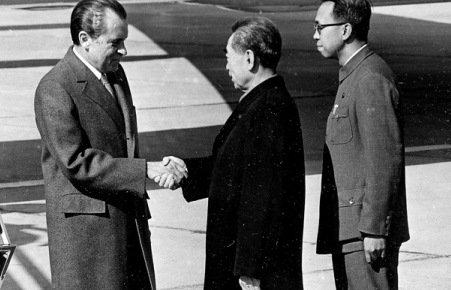
 Ji Chaozhu, right, stands near then Chinese premier Zhou Enlai, center, greeting then US president Richard Nixon at Beijing Airport on Feb 21, 1972. CHINA DAILY
Ji Chaozhu, right, stands near then Chinese premier Zhou Enlai, center, greeting then US president Richard Nixon at Beijing Airport on Feb 21, 1972. CHINA DAILY
"The purpose was to maintain secrecy," said Freeman, who then had no idea that despite a lustrous diplomatic career that would follow, he would be most remembered, up to this point, as the chief US interpreter on Nixon's China trip.
In fact, he was not even sure that he would be on it, not before he received baggage tags from those organizing the trip. According to Freeman, before the trip, Nixon, wanting to read up more on China, borrowed from him "quite a collection of books that I had accumulated" but "never returned them".
As Nixon and his 350-strong entourage including media left Guam International Airport for Shanghai on Feb 21, 1972, Freeman was on the backup plane feeling the "apprehension" around him. He switched to Air Force One later that day, and watched out of the window as Nixon and his wife Pat descended from the plane to the ground at the old Capital Airport in Beijing, the president famously extending his hand toward the Chinese premier, waiting for him.
"We were asked to get off the plane later so that members of the press, most of whom arrived with the backup plane half an hour earlier to get themselves in position, would get the best pictures the president wanted them to have," Freeman said.
Efforts to enable "the best pictures" including dressing Mrs Nixon in red, something Freeman advised against on the grounds of its wedding-ceremony connotations in Chinese culture, but it turned out to be a deft PR stroke. Yet when it came to making visual impact on the millions of television viewers in the US, nothing was as symbolic and powerful as that handshake.
Nixon recounted the moment in his memoir. "Chou (Zhou) En-lai stood at the foot of the ramp, hatless in the cold. Even a heavy overcoat did not hide the thinness of his frail body. When we were about halfway down the steps, he began to clap. I paused for a moment and then returned the gesture, according to the Chinese custom," Nixon wrote."When our hands met, one era ended and another began."
Nixon, whom Freeman described as "a very intelligent man and a strong advocate for whatever view he had", was also fully aware of the risky nature of his undertaking in terms of domestic politics, according to his interpreter.
"These days, some people are of the opinion that Nixon went to China to bolster his domestic political standing. I found that incredible because those of us on the trip had no idea that the trip would be so favorably received. It was a big gamble-Nixon was planning to run for reelection. If this had gone badly he would have failed."